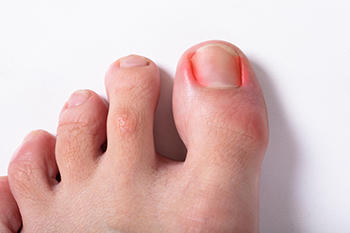NJ (908) 688-5577
NY (212) 737-2528
 When the toenail becomes curved and grows into the skin along the sides of the nail, it forms an ingrown toenail. This can result in pain, inflammation, redness, swelling, and in some cases an infection. Issues such as genetics, improperly trimmed toenails, sweaty feet, and shoes that are too tight can all lead to ingrown toenails. In fact, athletes are particularly prone to ingrown toenails because they sweat more often. While ingrown toenails are usually not very serious, if left untreated, they can get very painful and may even get infected. Patients with ingrown toenails who have diabetes or a compromised immune system, have persistent pain, or believe that the nail is infected should consult with a podiatrist for treating the nail.
When the toenail becomes curved and grows into the skin along the sides of the nail, it forms an ingrown toenail. This can result in pain, inflammation, redness, swelling, and in some cases an infection. Issues such as genetics, improperly trimmed toenails, sweaty feet, and shoes that are too tight can all lead to ingrown toenails. In fact, athletes are particularly prone to ingrown toenails because they sweat more often. While ingrown toenails are usually not very serious, if left untreated, they can get very painful and may even get infected. Patients with ingrown toenails who have diabetes or a compromised immune system, have persistent pain, or believe that the nail is infected should consult with a podiatrist for treating the nail.
Ingrown toenails may initially present themselves as a minor discomfort, but they may progress into an infection in the skin without proper treatment. For more information about ingrown toenails, contact Glenn Davison, DPM of Advanced Podiatry. Our doctor can provide the care you need to keep you pain-free and on your feet.
Ingrown Toenails
Ingrown toenails are caused when the corner or side of a toenail grows into the soft flesh surrounding it. They often result in redness, swelling, pain, and in some cases, infection. This condition typically affects the big toe and may recur if it is not treated properly.
Causes
You are more likely to develop an ingrown toenail if you are obese, have diabetes, arthritis, or have any fungal infection in your nails. Additionally, people who have foot or toe deformities are at a higher risk of developing an ingrown toenail.
Symptoms
Some symptoms of ingrown toenails are redness, swelling, and pain. In rare cases, there may be a yellowish drainage coming from the nail.
Treatment
Ignoring an ingrown toenail can have serious complications. Infections of the nail border can progress to a deeper soft-tissue infection, which can then turn into a bone infection. You should always speak with your podiatrist if you suspect you have an ingrown toenail, especially if you have diabetes or poor circulation.
If you have any questions, please feel free to contact our offices located in Union, NJ and New York . We offer the newest diagnostic and treatment technologies for all your foot care needs.